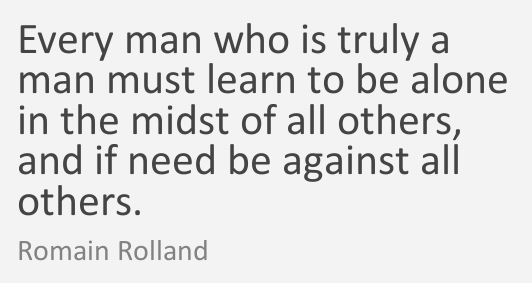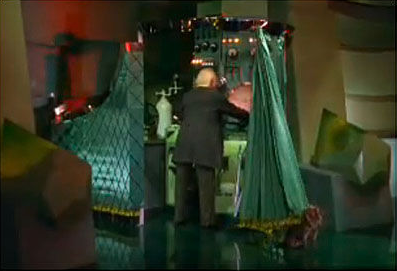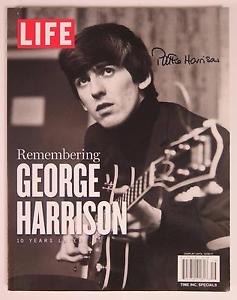|
Word Gems
exploring self-realization, sacred personhood, and full humanity
Editor's 1-Minute Essay:
Authority
return to "Authority" main-page
Oscar Wilde, The Soul of Man Under Socialism: “All authority is quite degrading. It degrades those who exercise it, and degrades those over whom it is exercised... People ... go through their lives in a sort of coarse comfort, like petted animals, without ever realising that they are probably thinking other people's thoughts, living by other people's standards, wearing practically what one may call other people's second-hand clothes, and never being themselves for a single moment.”
|
Henrik Ibsen, Peer Gynt, 1867: "What's a man's first duty? The answer is brief: to be himself."
Henrik Ibsen, Brand, 1884: "The man whom God wills to stay in the struggle of life, He first individualizes."
Henrik Ibsen, An Enemy of the People, 1882: "The strongest man in the world is he who stands most alone."

|
never being themselves for a single moment
The “authority” icon on the Word Gems homepage is being added with 90 others preceding it. As I mentally survey the many essays, featuring a host of topics, it strikes me that the essence of their substance revolves about the issue of discovering and coming to know the “true self.”
Oscar Wilde, in the masthead-quote above, said it well. Mindless cultish deference to authority becomes tantamount to living like a “petted animal.” It quickly devolves to “thinking other people’s thoughts,” a virtual “wearing” of “other people’s second-hand clothes,” and, worst of all, “never being themselves for a single moment.”
For those moved to explore these issues in greater depth, I would direct them to my writings on:
Cultism
Person
The True Self
Human Potential
The Fear of Death
But, allow me to stop myself right here, in that, the subject of “authority,” by way of the “true self,” impinges upon every other topic.
For example, there can be no true spirituality, or authentic relationship with God, or higher-level romantic love, without first coming to know one's essenial worthiness having been “made in the image.”
Those who have not explored the origins of the "false self's" inner neediness, that of “I am not enough,” will take refuge in various forms of materialism, external sources of strength. Driftings toward totalitarianism, as we briefly discussed on the "Authority" main-page, is a prime result of failing to access one's true self.
Until one comes to see that a locus of “authority” resides within one’s own sacred person, the “true self” linked to God as Universal Consciousness, one will fearfully seek for all manner of comforting externalities...
better-than-me heroes and saviors; shielding father-protectors; august figures in uniforms, power-suits, or robes; "holy books" and "holy pictures"; "infallible" gurus; angel-delivered undebatable doctrines; party platforms; "I thank thee Lord that I am not like other men"; unquestioned experts from afar; glistening badges and formidable colonnades; talismanic atoning prayers; rah-rah rallies and interminable seminars for huffing-and-puffing "to do the right thing"; god-talk banners and joyless "be happy and worship" music; catechism mantras and sing-song jingles; magic-wand blessings and mysterious hand-signs; a willpower-directed guilt-management and smiling too much, or not at all; little pieces of paper sporting ecclesiastical seal; artwork of people with strange faces; impressive pageantry and showmanship; "God-ordained leadership ability"; and, the ready bromide, "he's such a Nice Young Man," and "because he said it and his word is true."

Well, you get the idea; all these externalities, like the Wizard behind the curtain with his smoke-and-mirrors, are meant to bedazzle you, distract you, drain you, stupefy you, rob you of your critical faculties.
The root concept of “authority” is “author; not in the vein of writing but in terms of originator or master. An external authority, in other words, will posture a right to command and enforce obedience: “I am the one who bears the scepter of dominion, not you and your own soul.”
|
more than drinking the koolaid
The long reach of cultism encompasses much more than crackpot churches. The root idea of cult offers the sense of "cut." This core concept of "cut" leads us to images of refinement and refashioning and, by extension, development, control, pattern, order, and system.
Cultism as systemization finds a ready home in religion and philosophy which seek to regulate and redistill the patterning and ordering of ideas. However, in a larger sense, the spirit of cultism extends to every facet of society. We find it scheming and sedulously at work in politics, academia, family, corporations, entertainment, science, artistry – anywhere power might be gained by capturing credulous and fear-based minds.
See the “cultism” page for a full discussion.

|
Many of my core-article writings are designed to set you free from this diminishment of human dignity:
Until then, enemies of society will likely succeed in convincing you that you're unworthy. When eyes open, however, you'll finally reject, once and for all,
(1) the gross prevarication that God loves a self-appointed authoritarian elite more than he could ever love you and that God will not teach you directly, without intermediary;
(2) the illusion of "I am not enough";
and, instead, you will embark upon
(3) the journey to the center of reality, the holy-of-holies of your own deepest sanctified self; what Paul called, “living in the Spirit” -- that is, living in an awareness of Universal Consciousness.
As we learn from quantum physics, only Consciousness is real; in the whole universe, in this world and all of the next, only Consciousness is real; everything else derives from this primal source. And this Universal Consciousness can be accessed as part of one's own deeper self. Rather, Universal Consciousness does not need to be accessed so much as realized as it constitutes the substrata of the "true self."
Much could be said here. I would direct one’s further interest to existing articles on the Word Gems site.
|
hiding behind a mask of piety
Editor’s note: I often quote my long-time friend Adrian Smith here on Word Gems. The following is an excerpt from his January 9, 2020 blog-article, "The Mask Of Piety."
Those driven by the impulse to power, the crafty ones, have long ago learned to hide behind a mask of piety. The mask changes according to the times, sometimes religious, sometimes secular but always virtuous, devout, sanctimonious, holier than thou. A just cause has all the characteristics of a good mask. Today, concern for the environment is a worthy cause but could also serve as a mask for the exercise of power. Environmental crisis could be a reason to accept global government, centralizing control of all land, water, energy and the essentials of life under an undemocratic, unaccountable technocratic elite who would act as “saviours” …
It’s reminiscent of the now famous Milgram experiment, which examined the conflict between personal conscience and response to authority. The experiments began in July 1961. A variety of volunteers were recruited to administer successively higher electric shocks to subjects whenever they gave wrong answers to a series of questions. This was done under the supervision of mild-mannered men in white coats. The subjects being shocked were actors, but this was unknown to the volunteers. Amazingly, 65% of the volunteers administered lethal amounts of electricity, despite protestations from the subjects (loud screams and complaints about heart problems). All the volunteers continued to administer very high and unsafe levels of electricity. The experiment resulted in the following overall conclusion: People tend to obey orders from other people if they recognize their authority as morally right and/or legally based. It’s easy to see how something as simple as a white coat could be a kind of mask in the wrong hands. For one thing, it’s a symbol of authority ... The volunteers tend to accept their reassurances that the protestations of subjects are simply part of the experiment. Please continue. We accept responsibility. It’s all good.
|
|
they bought and sold you... controlled you...

While My Guitar Gently Weeps
I look at you and see the love there that's sleeping...
I don't know why nobody told you how to unfold your love
I don't know how someone controlled you
They bought and sold you...
|
|
Editor's last word:
I often say that the reality of the afterlife, of our coming "real life" of happiness in Summerland, changes everything. What I’ve found, regarding realistic definitions of the many Word Gems topics, is that it’s always a good idea to determine how these concepts play out in “the real world” over there.
Big Religion has crafted a view of authority laden with bureaucracy and heavy-handedness. It’s just not that way, at least, not in our home-world on the other side. For one thing, it’s not necessary.
In order to fit oneself to live in one of the “better neighborhoods” of Summerland, one will have developed a spirit of good will toward all. Citizens of Summerland no longer live their lives grasping for power-and-control, amassing wealth and a strutting of their status. The vain-peacock approach simply does not arise over there. Those for whom these illusions still dominate are spending time in a Dark Place, until they decide for learning how to live a better life. (They can leave their place of restriction today if they want to, but many do not want to.)
Father Benson tells us that there’re virtually no rules or regulations in Summerland. They’re not needed. The words of the apostle Paul finally come to full flower: “against such," those living in the Spirit, "there is no law.”
In other words, there's no need for overt manifestations of authority. People don't need to be policed in Summerland. They police themselves.
The locals in Summerland, those with eyes in their heads, come and go as they please and are just living happy lives, pursuing their own particular interests, whether these might be university studies, music and the arts, sailing, backyard parties with friends and relatives, space exploration, hiking in the mountains, crafts and gardening, going to concerts, eating-out just for fun, raising children, scientific research, service projects, just plain loafing on a white-sand ocean beach, or whatever pleases one’s fancy.
There’s no need for obvious authority figures or policing institutions for those who now have “the law written upon their hearts” – another phrase from Paul.
See the following comment, too, by Brother John.
|
|
Brother John of Glastonbury: "Everything here is law-and-order; and yet one is hardly conscious of the order or the law. We are ruled, but are not conscious of the ruling."
The 500 Leslie Flint "direct voice" tape-recordings include a testimony by Brother John of Glastonbury (1393-1464 CE), a former monk during his Earth-life.
The following is from the June 3, 1970 recording:
"Everything here is law-and-order; and yet one is hardly conscious of the order or the law. This may sound odd or strange but, what I’m trying to say is, though we are ruled, we are not conscious of the ruling, inasmuch as there is no one person who orders or instructs, in that sense… There are many souls who ‘organize,’ and yet the ‘organization' is such that it seems the most natural thing… There is nothing here that mars or jars. Everything here falls gently, peacefully, harmoniously, into place. It is as if you begin to see, gradually, the jig-saw puzzle of life coming into a clearer picture.”
Editor’s note: Brother John offers one of the very best short descriptions of the laissez-faire approach to regulation and government in Summerland. People follow their own inner passions and directives, their own Jeffersonian personalized “pursuit of happiness,” with very little external-authority guidance (unless they ask for advice from a Spirit Guide). And this is why it’s so important to cultivate one’s sense of the “true self.” And, concerning those who “organize,” see our friend Elizabeth Fry’s testimony.
Also, read more about life in Summerland here.
|
|



